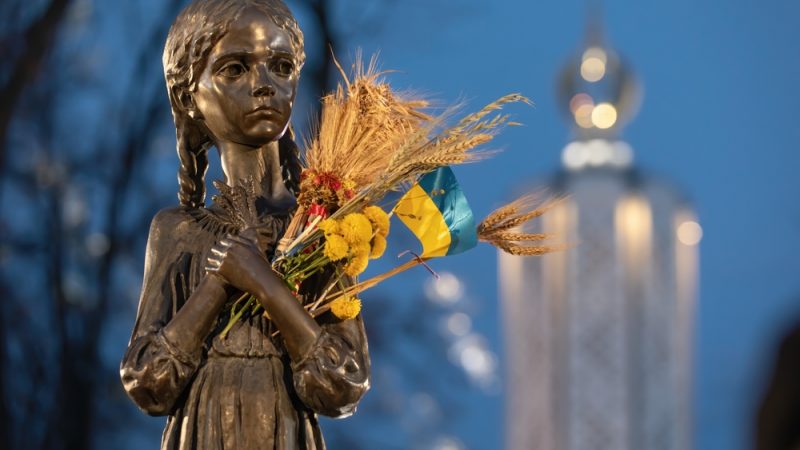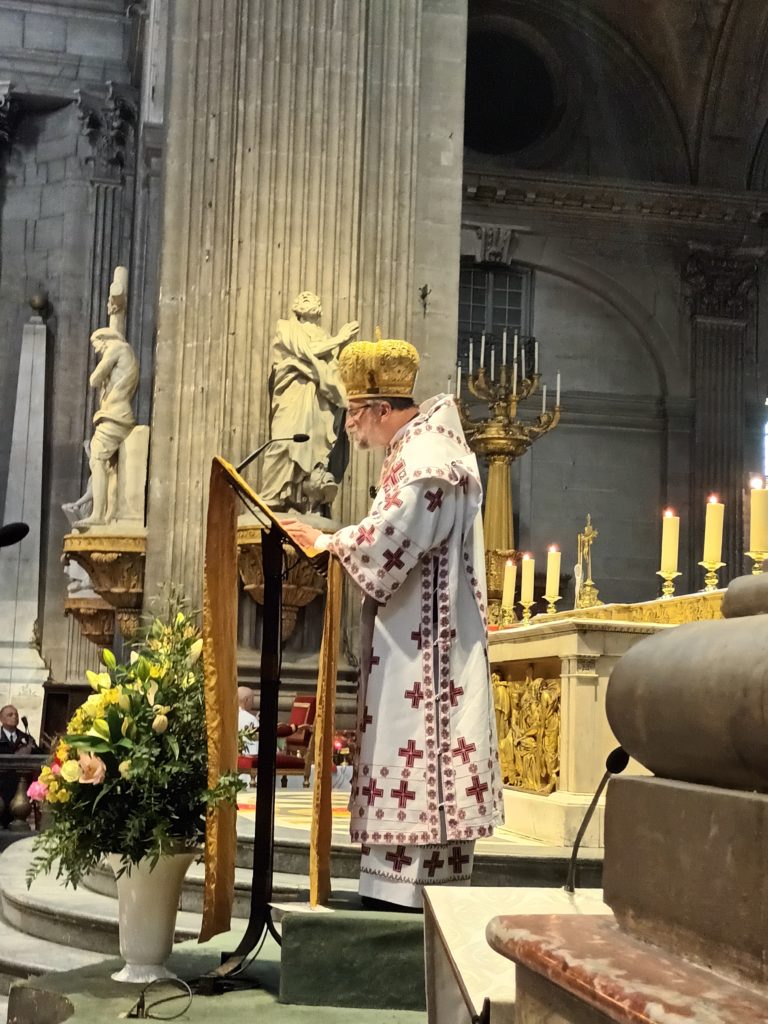> Вшанування пам’яті жертв Голодомору та російсько-української війни
COMMEMORATION FOR THE VICTIMS OF THE HOLODOMOR AND THE RUSSIAN-UKRAINIAN WAR
20th November 2022, St-Sulpice Church, Paris
HOLODOMOR
Before Father Ihor Rantsya sent me an e-mail inviting me to attend this event on Sunday, 20th November, I knew neither the word nor what it refers to. HOLODOMOR: between 4 and 7 million people died in Ukraine during 1932 and 1933. Died of starvation. Holodomor is a Ukrainian word meaning « extermination by starvation ». An idea, and an outrageous plan of Stalin’s.
To know more about and better understand this historical tragedy, there are books, articles and archives. To summarise, if that’s possible, in order to finance its industrialisation, Russia ordered the mass export of grain from Ukraine, and never mind the Ukrainians. Requisitioning or looting of land, famine, cold, repression, deportations; a planned will to destroy a people.
As sometimes is asked: Genocide, or not genocide? The very question mark sends shivers down one’s spine. In any case, the world agrees on the facts: crime against humanity (in 2008, the European Parliament judged, and recognised this famine as a: « crime against the Ukrainian people and against humanity »).

Statue in honour of the victims / Kiev, Ukraine
When I interviewed Father Rantsya, Vicar General of the Eparchy of St Volodymyr the Great in Paris, in March 2022, to the question as to why he had agreed to talk to me for the online magazine amuse-bec, which is usually not much concerned with politics, economics or religion, his response was:
Art is involved in all this. Our prayer, the Byzantine prayer, is always a sort of art. There are always Icons, and they are art – paintings. There is also the art of singing – hymns, and often these two kinds of art accompany our soldiers. They carry the Icon in front of them and they have these melodies in their heads. It is a spiritual method of resistance. We need to mention, and to discuss, the awareness of our soldiers, of our people: they are on their own territory, in order to protect it. It seems to me that art always accompanies the spirituality of Ukrainians. Including that of our soldiers.
It is largely in response to this that I attended the Divine Liturgy (celebrated by Bishop Hlib Lonchyna, Bishop of the Ukrainians in France) this Sunday. The liturgy, and the Requiem service that followed, were in the Byzantine rite and I wanted or needed to be there. Needed to, in fact. To see, feel, hear and come closer, both physically and spiritually, to the powerful impression that the meeting with Father Rantsya had made on me. To his words of peace, love and energy. I insist on the word energy. Or dynamism. I insist, because without it, my preconceptions would have remained at ground zero (where they were only a year ago); soft, passive, useless church people.
No sign of that here, and I’m jumping at the chance to report what Mgr Pascal Gollnisch (Director of L’Œuvre d’orient) said during his homily:
« Some talk about negotiations. But negotiations for what? Let’s talk, let’s talk if we can achieve peace! But if these negotiations mean making concessions to the aggressor, that would be a moral fault.”
Bravo. No doubt, one shouldn’t say « bravo » in these circumstances, I’m saying it anyway, “Bravo!”. And the whole ceremony was magnificent! No doubt either, when in a church, and transported by a choir that one finds superb, one shouldn’t applaud; I was itching to, but no. Because around me people were praying and making the sign of the cross. Nearby, a dozen paces away, there is war. There has been war for a long time. People are fighting, and people are praying for freedom and dignity.

It’s the end of the service of commemoration. I go outside, smoke a cigarette, and go back in. The press conference takes place in a chapel in Saint-Sulpice. I listen, I record everything. I want to interrupt, ask a question (for example, « Good afternoon. David Laurençon, for amuse-bec.com. This is a question for everyone, “In your opinion, why is it that I have never heard of Holodomor? ») but it’s freezing in this chapel, it’s sapping my energy, and I tell myself I’m an imbecile for being cold.
I’m still listening, the whole time. I understand better, I am cold but I am safe and I understand better.
A man speaks up. I don’t know who he is. As a journalist, I should know, but I don’t. He introduces himself. He is a historian, he was in France in February 2022, he could not return to Ukraine. He tells his story. That of his grandparents. His grandfather died during the artificial famine of 1932. Today, his friends who remained « on the spot » tell him about the suffering caused by hunger and cold. Ninety years have passed and it is still the same horror. Another man speaks up. A priest. He says that politicians never learn anything, they don’t know how to learn the lessons of history.
« Learn the lessons of history »: a phrase heard a thousand times. I am hearing it again and for the first time, I understand it.
David Laurençon
Translation from French by Hilary Burgess
> Interview with Father Rantsya
> Ukrainian Greek Catholic Church